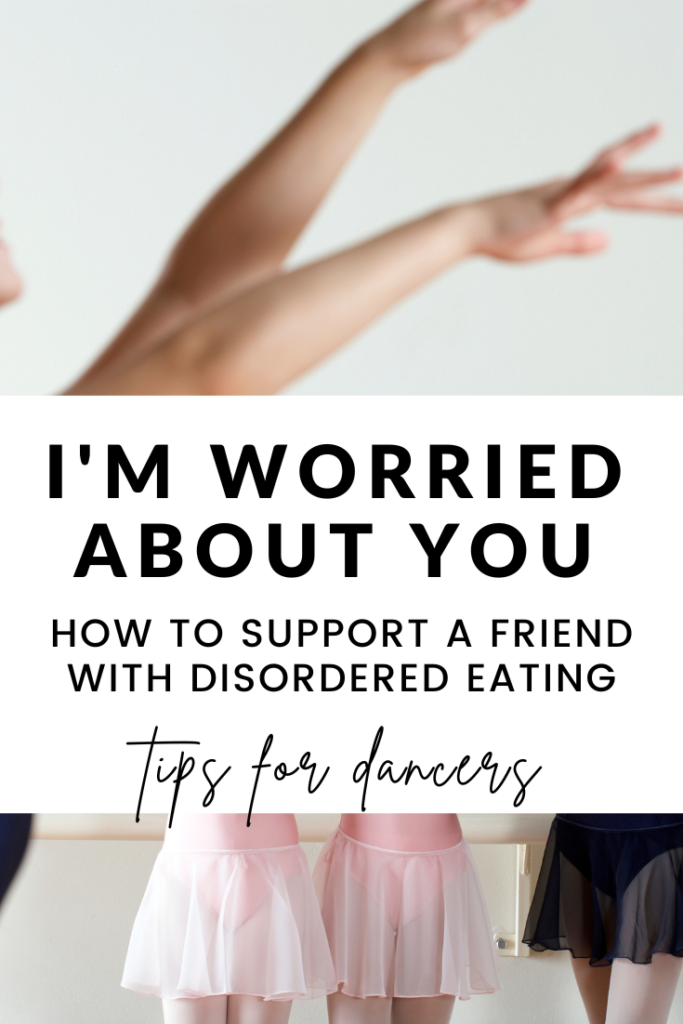If you suspect a dance friend is struggling with disordered eating or an eating disorder, here’s what to do.
When you suspect that a dance friend is struggling with disordered eating or an eating disorder, it can be challenging to know how to offer effective support. Fears of “saying the wrong thing” leaves many dancers at a loss for words. And while the conversation is one to tread lightly, avoidance can drive even the closest of friends further apart.
Unlike with a diagnosed eating disorder, disordered eating is a path that many dancers might not even know they’re on. With “clean” eating both normalized and glorified in the studio, overcoming the dieting mentality can feel like an uphill climb for ourselves, let alone our dance peers. Dancers are especially vulnerable to a comparative mindset, and messages surrounding restrictive dieting and exhaustive cross-training— both commonly encouraged as methods to “improve performance” (code: lose weight). This emphasis on the body creates an environment susceptible to the development of eating disorders.
Your role in supporting a dance peer is integral— but it’s also one that comes with a unique set of do’s and don’ts, requiring sensitivity and understanding. In this article, you will learn how to support your friend during this difficult time.
5 steps to support a dance friend who is struggling in their relationship with food
#1: Educate Yourself
Before approaching your friend, learn about the signs and risks of disordered eating. Understanding the complexities of these behaviors will enable you to approach the situation with empathy and knowledge. Assuming that a friend is just “not eating” is not a strong enough case to warrant interjection. In fact, this can lead to an unproductive conversation that does more harm than good. Frequent cancellations, especially for events surrounding food, might be a sign of isolation, which is commonly seen with Orthorexia. Credible resources can further help to increase awareness about the dangers of these restrictive behaviors.
#2: Choose an appropriate time and setting
Regardless of how close you are, be ready for a difficult conversation. A dancer who is struggling with disordered eating may not be ready or willing to talk about it. Starting the conversation in a public area, such as in the dressing room or at the barre, won’t be your best option. In fact, this can leave dancers feeling isolated and stressed. Rather, plan for a comfortable and private setting to discuss your concerns. Find a time when you can talk without distractions or time constraints, allowing for an open and honest conversation.
#3: Express concerns with empathy, compassion, and relatability
Dr. Melanie Kressel, PsyD a clinical psychologist encourages dancers to “initiate the conversation in a gentle, supportive, and relatable manner.” Express your concerns for your friend’s well-being and make sure they know you are there to listen and support them without judgment.
When discussing your concerns, use “I” statements to avoid sounding accusatory. For example, say, “I’ve noticed that you seem to be struggling, and I’m worried about you” rather than, “You have a problem.” Throughout the conservation, Dr. Kressel suggests using “neutral, supportive, and simple language that is not accusative.”
Share your experiences (carefully)— this helps to find relatable ground. Given our culture, we are all subject to diet and wellness culture. But avoid discussions around specific weights, calorie targets, and even nutrition advice as these can breed comparisons. Dr. Kressel states, “normalizing these disordered thoughts in the conversation sends a message that your friend is not alone. The hope is that by starting the conversation, individuals will feel motivated to seek treatment to establish a healthier relationship with food and their bodies.”
#4: Give resources, not advice
While your role in supporting your friend is integral, remember that, unless you are a licensed medical provider, you are not equipped to offer a diagnosis or intervention plan. If not qualified, it’s discouraged to hold any assumptions based on the nature of your friend’s struggles.
Rather, your role is to provide support and encourage them to seek help from a qualified professional. Offer to help your friend find resources. A Registered Dietitian Nutritionist with advanced certification in Eating Disorders, along with a licensed mental health therapist is recommended.
#5: Raise generalized concerns to those in charge
It’s incredibly important to respect your friend’s privacy and boundaries. Remember that recovery is a personal journey, and your friend may not feel comfortable discussing all aspects of it with you, or anyone, immediately. A first step can be to recommend that your dance school, studio, or company host a group nutrition workshop.
But according to Dr. Kressel, “depending on the severity of the individuals’ struggles, it might warrant a more direct approach… however, we do not want to corner the individual and make them feel attacked. At the same time, we want them to recognize their issues and seek proper help.” The bottom line? “If you are not sure, it is always best to bring your concerns to a trusted adult.”
Supporting a fellow dancer who you suspect to be struggling with either disordered eating or an eating disorder requires compassion, understanding, and patience. Remember that you cannot, alone, solve another’s struggles. But simply being a listening ear can make a significant difference. Listen actively and non-judgmentally. Sometimes, just having someone to talk to can make a significant difference in their journey toward recovery.



